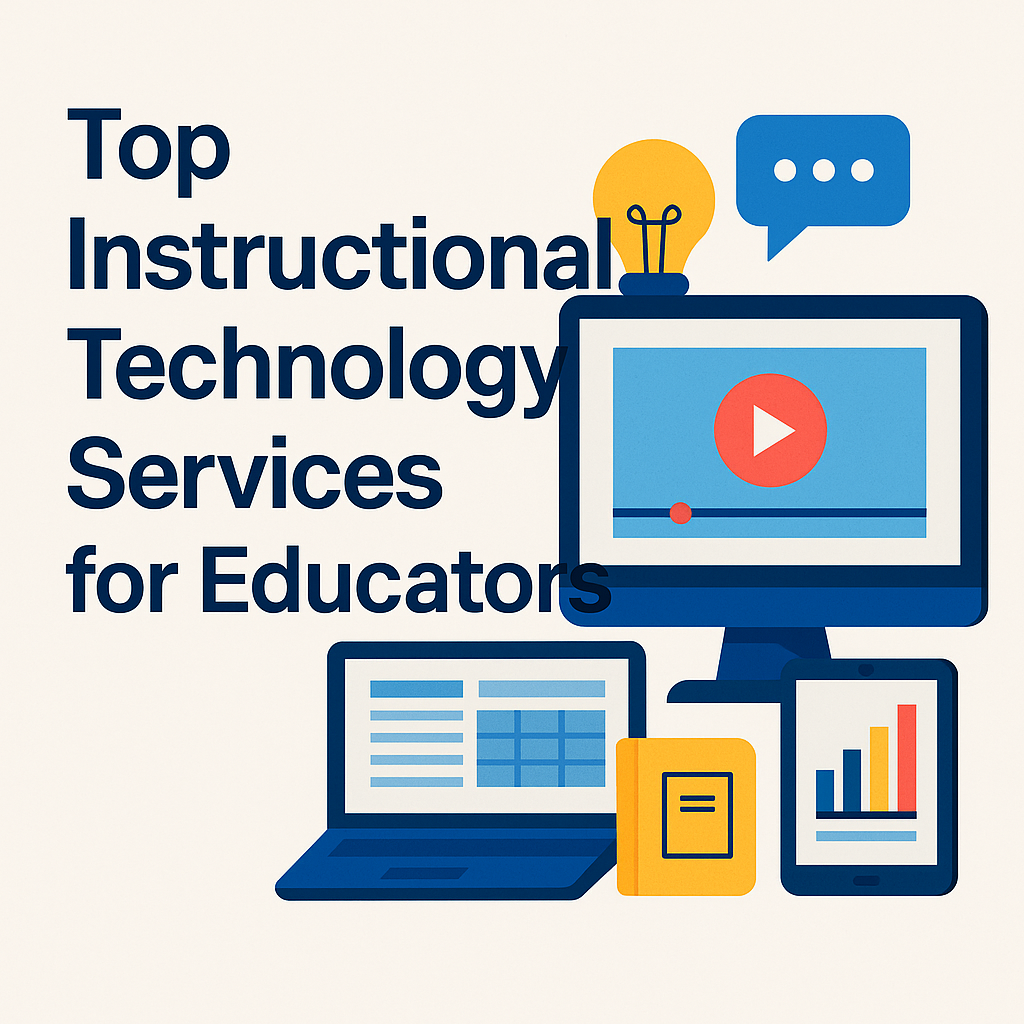Introduction
Instructional Technology Services (ITS) is one of the essential elements of an efficient teaching and learning that has developed in a quickly changing world of education. As the use of technology in classrooms, offices and virtual learning becomes increasingly major, ITS serves the requisite equipment, services and approaches to improve learning results.
Instructional technology services are essential no matter you are an educator who wants to increase learning engagement with students, an administrator that wants to simplify learning platforms, or a schoolchild who wants better access to online resources. This paper shall dwell on the numerous aspects of ITS including how it leads to academic excellence, increases teacher work efficiency and equality in education. We will give examples, comparisons and real world experience with the goal to help you make the best use of ITS.
So What Is Instructional Technology Services?
Instructional Technology Services (ITS) is defined as the support, implementation and management of technology solutions in teaching and learning environments in order to improve teaching and learning experiences.
Important services of ITS:
Providing faculty with course delivery digital tools.
Administration of Learning Management System (LMS) such as Canvas or Moodle.
Conducting technology integration training and workshops.
Making it accessible and keeping to the digital standards.
Core Services:
Technology assistance in classroom (smart boards, projectors, etc.)
College course development support
Installation and problem solving of video conferencing
Support in the development of digital media
ITS is beneficial in closing the divide between technology and pedagogy and therefore makes learning more interesting, affordable and effective to all the stakeholders.
The relevance of ITS in Contemporary Education
As the remote learning and blended classroom teaching rise, ITS has become the back bone of any education facility.
Advantages of ITS:
Improved learning outcomes: Dynamic and individualized learning can be found in technology.
Faculty Support: Professors have on the job training and guidance.
Scalability: Virtual tools will enable schools to attend to a greater number of learners.
Continuity: ITS keeps the learning intact, even in the occasion of disruptions such as pandemics.
Real-Life Application:
Meanwhile, ITS teams facilitated the rapid switching to online learning conditions during the COVID-19 pandemic. They installed video conferencing services, switched course materials to the net, and offered urgent technological assistance.
ITS cannot only be viewed as a technical department but a pedagogical partner in the digital transformation of education.
Key Technology in ITS
The Instructional Technology Services are based on an extensive range of technologies that enable teachers and students.
Widespread Tools in ITS Ecosystems:
Learning Management System ( tutor. Canvas, Blackboard and Model)
Video Conferencing Programs (Zoom, MS Teams, Google Meet)
Digital Whiteboards (Jam board, SMART Board)
Cahoots, Quizzes, Google Forms
Multimedia Editing Software (Adobe Creative Cloud, Catania)
Integration Strategy:
ITS will make all these tools interoperable, safe and user friendly. Employees and pupils get to be trained and record on how best to utilize the tools so as to achieve their best potentials.
Such technologies are mediated and regulated towards the simplification of the teaching and learning process within the various learning environments.
Instruct Design Support
Instructional design support is one of the most important services that ITS offers, allowing a teacher to develop learning that is not only efficient but also engaging.
ITS and Instructional Design:
Matching assessment with learning objectives
Production of multimedia contents
Universal design and accessibility (UDL principles)
Design of online courses to learn effectively
Case study example:
The work of a university ITS team with nursing faculty involved redesign of modules of clinical training. Using interactive video scenarios and adaptive quizzes, the student performance increased by 23 percent within one semester.
Pedagogy and technology come together via instructional design but ITS is the bridge.
Training services offered to faculty and staff
Regardless of the advancement of the technology, it is useless without people. This is the reason why training is central to the Instructional Technology Services.
Kinds of training provided:
Individual training on the use of digital tools
Training in course design and delivery
Faculty tech pro certification programs
Online seminars concerning new technologies in learning
Benefits:
Better confidence among teachers
More use of innovative practices
Decrease in classroom disturbances due to technology Reduction in classroom disturbances due to technology
ITS enables the educator to become at the level of the technology, develops the culture of life-long improvement and innovation.
Increasing Student Involvement
ITS puts direct support to student engagement in the form of immersive and interactive tools.
Engagement Strategies ITSs promote:
Lessons with gasification components
Investigative video and simulations
Immediate polls/clicker responses
Course materials that can be viewed using a mobile phone.
Student Feedback Overview:
It was easy to learn and even interesting with the available lecture recordings, quizzes, and interactive case studies. I suppose that was the answer, since I am a major in Psychology at undergraduate school.
ITS increases broadcasting levels and motivation, which makes the retention rate and the level of success among students higher.
Equity and Access to Education
ITS provides equal access to instructional tools and supports to learning.
Accessibility Goals of ITS:
Video captions Video captioned content
Course materials that are readable with screen readers
Accommodations in technology to cope with the differently-abled students
Translation tools of language
Enforcement of equity:
ITS also makes sure to provide students in underserved locations access to the required hardware and connectivity products via device loan schemes and alliances.
ITS promotes inclusive learning by eliminating restrictions.
Data-Driven Decision making
The ITS enables institutions to make high-level decisions utilizing the information of learning analytics and information.
The important metrics monitored included:
The rate of student engagement
The rate of course completion
Tool usage-statistics
Performance trend in assessment
The comparison of Traditional and Data-Informed Teaching:
| Criteria | Traditional Approach | Data-Informed Approach |
| Decision Basis | Intuition | Analytics & Insights |
| Feedback Cycle | Slow | Real-Time |
| Personalization | Limited | High |
ITS supports wiser choices of continuous course enhancement and higher learning performance.
ITS Support of Hybrid and Online Learning
Both hybrid learning models and fully online learning models rely on ITS extensively as far as support and infrastructure are concerned.
Key Services:
Customization of LMS to online courses
Access preparation/ setting of a virtualized classroom and tests
Technical support of students and faculty
Hosting and distribution of digital contents
Example:
With the assistance of ITS, a community college started its first hybrid semester. They have also reported a 45 percent rise in terms of student satisfaction when it comes to online learning experience because of intuitive indicators and correct tech support.
Modern remote instruction has an ITS as its infrastructure.
Future of Instructional Technology Services
Service offered by ITS is always advancing as the education requirements change.
Emerging Trends:
Personalized learning assistants using AI
AR and virtual reality classrooms
Block chain certifications of course completions
Increased cyber security measures to online learning
Strategic Preparation:
Institutions are making future ready ITS by
Recruiting instructional designers that are tech-savvy
Strategic Technology plan development
Partnership with ED tech start ups
Innovation and flexibility will be the future of ITS whereby learning is up to date with technology.
Frequently asked Questions (FAQs)
What is meant by instructional technology?
Instructional technology can be described as applications of technology tools and systems, to maximize the learning and teaching process.
What does ITS do to help teachers?
ITS supports educators, including offering training, offering online tools, conducting course design, and problem-solving technology issues.
Does ITS applies only to online courses?
No, it supports both a conventional and an online environment of learning (including a hybrid).
How can ITS be beneficial to the students?
The advantages to students are enhanced interactions, accessibility, instant review, and learning supplies.
Will small institutions gain the advantage of ITS?
Absolutely. Reduced ITS units or out-sourced services can assist a lot particularly in online or distant environment.
Conclusion
The Instructional Technology Services are transforming the education offerings and the process itself. ITS can help improve classroom interaction as well as remote learning infrastructure to ensure the future of education. ITS technology provides the ability to combine data, accessibility, and innovation in the teaching and learning processes so that institutions can support the rapidly changing needs of the realms of education in the 21st century.
As an educator who has to master his teaching and drastically improve his skills or as an institution, which has to boost academic performances, the usage of ITS is not a choice anymore but a necessity. Review ITS offerings in your institution, participate in trainings and become a member of the revolution in digital learning.







1 thought on “Top Instructional Technology Services for Educators”